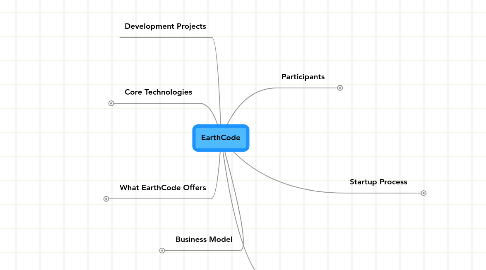
1. Development Projects
2. Business Model
2.1. EarthCode is a For Profit Entity
2.2. Charge For-Profit Businesses for Code
2.2.1. Sell Software to For-Profits
2.2.2. Provide consulting to For-Profits
2.3. Give Away Code to Not for Profits
2.4. Accept PRIs for social change functionality
3. What EarthCode Offers
3.1. Hacker Lab
3.1.1. Infrastructure for distributed development
3.1.2. Hackathon
3.1.2.1. Three Day Events
3.1.3. Financial stability for developers working "for-benefit"
3.2. Next-gen social software
3.3. World-class development at social-change prices
4. Core Technologies
4.1. Transactions
4.1.1. ROVR
4.1.2. Community Change Card
4.2. Community
4.2.1. Interra OS
4.2.1.1. Program Portal
4.2.2. Social Networks
4.3. Identity
4.3.1. Universal Identifiers
4.3.1.1. OpenID
4.3.1.1.1. Directory GUIDs
4.3.2. Reputation
4.3.2.1. Smartocracy/Hero-tagging
4.4. Directories
4.4.1. Interra Merchants
4.4.2. WISER
4.4.3. Freebase
4.4.4. Salesforce
4.5. Intercommunication
4.5.1. Intercom project
5. Participants
5.1. Coordinators
5.1.1. Jon Ramer
5.1.2. Brad DeGraf
5.1.3. Jim Benson
5.1.4. Ed Bice
5.1.5. William Rowden
5.2. Developers
5.2.1. Andy Hook
5.2.2. Brian Hamlin
5.3. Founding Orgs/Clients
5.3.1. Interra
5.3.2. NCI
5.3.3. Compumentor
5.3.4. Media Consortium
5.3.5. YouthGive
5.3.6. Meadan
5.3.7. Planetwork
5.4. Service Providers
5.4.1. Michael Gosney
5.5. Investors
5.5.1. Marc Benioff
6. Startup Process
6.1. work for hire to start
6.2. Foundation Software
6.2.1. Funded by founding orgs
6.2.2. Hackathon to design
6.2.3. 3-month sprint to execute
6.3. Building on the foundation
6.3.1. Founding orgs and clients pay to extend
6.3.2. PRIs to add important features
7. Management Philosophy
7.1. Agile Management
7.1.1. Maintainable Code
7.1.2. Clear Processes
7.1.3. Clear Standards
7.1.4. Low cost of change
7.1.5. Low cost of knowledge transfer
7.1.6. Rapid prototyping
7.1.7. Modular Design
7.2. Open Source
7.2.1. Make use of existing elements
7.2.2. Gain efficiencies through OS community
7.2.3. Give back to the community
